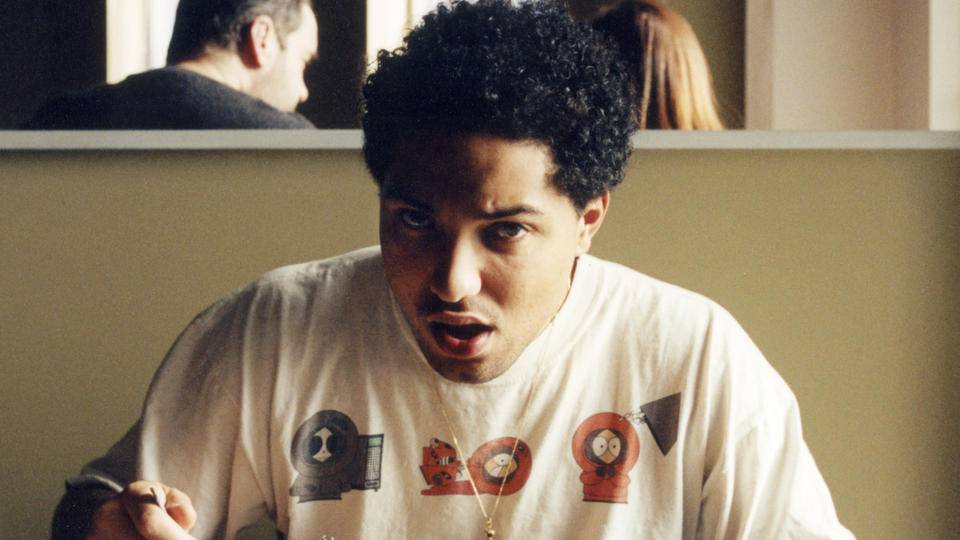How BDSM Is Being Used To Treat Mental Health Issues

Talk to a hundred people with mental health issues, and you’ll hear a hundred different stories of coping with our crazy. For some of us, it means cognitive behavioural therapy, for others, mindfulness, psychotherapy or medication. Whatever we try, we’re all after one thing: the ability to function, to create a strategy for feeling well. For me, that’s CBT, and writing endlessly about my anxiety and depression. For Tani Thole and Leslie Rogers, the co-founders of the Light Dark Institute in California, that means personal growth courses, some of which draw heavily from BDSM.
Yep, BDSM. That thing your mum reads about late at night when she’s fingering through her well-worn copy of Fifty Shades Of Grey, or the thing your boyfriend thought he’d try that one time when he found some furry cuffs on offer in Ann Summers. But BDSM is so much more than these sexual frivolities. BDSM is an umbrella term that stands for Bondage Discipline, Dominance Submission, Sadomasochism. In other words it’s about power.
In most BDSM relationships, there is a sub and a dom, a submissive and a dominant, who play out the roles that suit their desires. Sometimes that involves some 50 Shades-style rope play, sometimes it’s as simple as a dom telling a sub what to wear that day. But what does this have to do with mental health issues?
I spoke to Tani and Leslie to find out.
“There are needs and desires that need to be met,” said Leslie. “People explore BDSM as an ‘erotic’ lifestyle, but we’re talking about alternative lifestyles that can actually meet the needs of people that our culture doesn’t.”
“I have this deep softness and surrender in my way of being in the world, that when I was a kid wasn’t always seen or received.” said Tani. “I learned to put that away, into a mental box, because it wasn’t conducive to being productive or functional in a traditional sense, and I got used to coping with it in that way.”
“But by my late-twenties I was a single mom, and the years of stress and strain of hiding my true self really took their toll. I had a colossal breakdown, and wound up unemployed and on welfare for three years, really struggling. At that point I was convinced I had nothing of value to offer the world. I went through a period of intense depression, and my only avenue was to start therapy and try to figure out what was ‘wrong’ with me.”
“I’d been interested in kink as long as I could remember. My natural tendency is submissive. I’d had submissive fantasies from childhood, and for years feared it was another thing wrong with me. I indulged these desires in a few adult relationships, but when I met Leslie we went immediately into a Dom/Sub relationship, where I was the Sub.”
“I had training in being a coach and healer, and Leslie immediately saw my potential, so one day he told me to create a list of five people who would benefit from my therapy, call them up, and offer them a session for $100. It was terrifying, and I could never have taken that step on my own, but because he was dominating me and was consensually surrendered to his will, I was able to take that step. One thing lead to another and within a couple of months I was actively searching for clients, and totally believed in my self-worth. And now I get to do that through the Light Dark Institute.”
The Light Dark Institute utilizes traditional BDSM practices as one of the many tools they employ in their model of personal growth therapy, hosting sessions at a kink-themed B&B. And, before you ask, no, they don’t (always) tie you up and whip you while asking about your daddy issues. What they do is so much broader than the sort of BDSM you might be familiar with. For them, the most important thing is ‘embodied play’.
Have you ever gotten home after a long day of work, where maybe you made a few mistakes, got a few sly looks from your boss, and thought you were worthless? Or maybe you’ve felt the irrational desire to be violent to a loved one, and recoiled in disgust at your own thoughts? What do these two scenarios have in common? Shame.
Tani and Leslie believe that unexamined shame has a huge impact on mental health and wellbeing, and address it through roleplaying out the shameful memory or fantasy. In doing so, they hope to show that everyone feels shame and, once you get past it, you’re still loved, accepted, and the thoughts maybe aren’t that bad.
“In one scene your whole life can change,” said Leslie. “One scene where you’re willing to be vulnerable or be humiliated, or let your sadist out, or let out some weird aspect of yourself, your whole life can be different after that. You can walk through the rest of your daily life knowing, ‘hey, I’m playing a role right now, and I can play it well.’”
I’ve previously written about how video games can help with mental health, and it seemed that a similar theme was emerging. To paraphrase Brian Sutton-Smith, the late human behavioural theorist, the opposite of depression is play. For me, that means video games. For Tani and Leslie, that means roleplaying. But how effective is it as a form of mental health ‘treatment’.
According to a study from the Journal of Sexual Medicine, who surveyed 902 people who engage in BDSM, and 434 non-BDSM ‘vanilla’ participants, those who preferred a bit of bondage and S&M were actually more open and honest about their feelings, and displayed fewer signs of neurosis.
Speaking to LiveScience, Andreas Wismeijer, the lead author on the study, theorised that the BDSM-friendly participants might have scored higher on the study as they tended to be more at ease with their sexual desires, and be more inclined to communicate openly and honestly with their partners. This translated into the BDSM participants recording higher levels of wellbeing over a two week period than ‘vanillas’.
Of course correlation need not imply causation, but it's undeniable that there’s a growing appetite for BDSM-awareness in traditional therapeutic activities. In the US there has been a noted rise in therapists offering kink and BDSM-friendly services. Websites like the National Coalition for Sexual Freedom list medical practitioners across the country who understand that liking to be choked in the bedroom isn’t necessarily a cause for concern in terms of mental wellbeing.
The BDSM-friendly therapy scene has yet to take hold as effectively in the UK, but sites like Pink Therapy, which hosts a database of LGBTQ+ aware practitioners, and Kink Aware Therapist, run by David, a therapist in Plymouth, show that there is an appetite for therapy that embraces gender and sexual politics. David’s website makes it very clear, “you will not be stigmatised by your therapist”, and what is it to be stigmatised if not to be shamed?
I asked Tani about how the Light Dark Institute’s sessions help with a client’s shame.
“If we play out a humiliation scene where someone really grinds that shame into you, you think ‘I’m actually being seen as that. Somebody else is seeing my shame, I don’t have to keep pretending that it’s not happening, and they still love me and we’re still connected anyway. Maybe I’m okay.’”
This certainly struck a chord with me.
When I was first experiencing intrusive thoughts, I had no idea where they were coming from. I would have panic attacks over an irrational need to pee myself when stepping onto the tube, or have random violent thoughts about loved family members which left me wondering if I was becoming the sort of monster you read about during 2am Wikipedia sessions. I was terrified of anyone finding out about these thoughts, of being seen to be the head case I was so terrified I was.
Because I didn’t speak about them to anyone else, I internalised, and started to think that maybe I was defined by my intrusive thoughts. It wasn’t until I opened up and talked to my therapist that I became reconciled to their presence, and it wasn’t until I told those closest to me, and eventually my boss, that the shame dissipated, and I was able to function I was crazy, and you know what, that’s okay. I’m coping.
I decided to speak to a couple of other people with mental health issues, who also enjoy kink and BDSM, about how the two intersect.
“I've always been interested in scenes of punishment, people being tied up or chained up, flogging.” Said Tina (who chose to remain anonymous), a late-twenties sub, who lives with depression. “I was fascinated by corsets and bondage as far back as I can remember. When I was 18 I had a fling with a guy who was very Dom-y (he was 18 too), he once tied me by my wrists from a ceiling beam and spanked me, and it was like - BOOM. This is what I've been looking for.”
“I love someone else taking charge, bossing me around - all the pressure is off me, my brain shuts up and I'm not thinking "does he like this, does he think I look stupid, I probably look fat, God I'm ridiculous and awful". When I'm subbing I just do what I'm told, so I KNOW that's what my partner wants to do, and it's blissful. I don't like humiliation scenes, I just like someone totally taking charge.”
I also spoke to Ezra (also anonymous), a mid-twenties dom with anxiety and depression, about his experience of being a top.
“For the longest time I felt shame in my desires. I had a couple of girlfriends before who had experienced trauma, and am aware of male abuse of women in the bedroom, so was acutely aware of my strength and would go out of my way to restrain it in case I hurt anyone.”
“Then during a one night stand, my partner asked me to hold them down, to be dominant. At first I was hesitant, but after talking about it with them I went for it and didn’t hold back. And you know what, it was incredible. I felt so free, and like I was normal. That my size and strength was good, and sexy. I have taken this dominance into my new relationship and have never been happier or more fulfilled sexually.”
In both these cases, it’s clear to see that before BDSM, shame had dominated their mentalities in the bedroom. And by tackling it through kink, they came out the other side more aware of themselves, and enjoying their relationships more. Obviously kink and BDSM isn’t for everyone, so maybe put that Love Honey order on hold, but for these people, talking openly and honestly about their ‘darker’ sexual desires has helped eradicate that shame.
It may well be a long time before kink-friendly therapists are catalogued in the UK, and longer still until it's available on the NHS, but for now it seems to be an avenue of consideration for some with mental health issues. I asked Tani and Leslie whether they had considered franchising out their Institute to the UK.
“We do teach courses, but they’re quite intensive.” Said Leslie. “We’ve been thinking about coming over to London at some point during 2017.”
See you there.
'Now why not watch this vid of people playing the mostawkward af game of sexy Would You Rather…'





